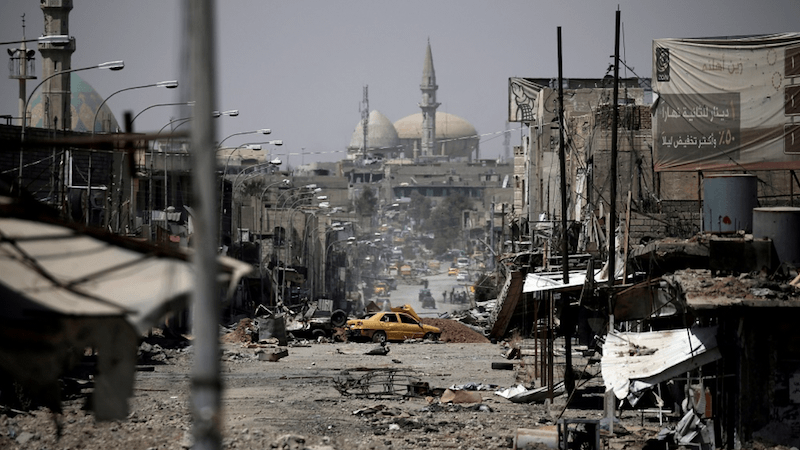Circle of life
February 14, 2018 | Expert Insights

In a conference that began on Monday, Iraq announced that it will require approximately $88 billion to begin post-ISIS relief efforts to reconstruct its economy. However, only $4 billion has been raised so far. Kuwait, one of Iraq’s closest neighbours, has notably committed $1 billion in investments.
Officials have warned that if the country is unable to regain a sense of normalcy, this could allow for a resurgence of various terrorist organisations.
Background
The Republic of Iraq is located in Western Asia and was once home to the Sumerian, Assyrian, Akkadian, and Babylonian empires. Officially formed after the dissolution of the Ottoman Empire in 1920, the country has seen much conflict since the start of the 21st century.
Kuwait is a small constitutional monarchy that stretches over 17,800 square kilometres at the tip of the Persian Gulf. It is located to the south-east of Iraq; and Iraq and Saudi Arabia are its only neighbours. The first Arab state in the Persian Gulf to establish a constitution and parliament, Kuwait prospered through the 40s to the 80s. However, the country saw an economic crisis in the 80s after a market crash and decrease in oil prices.
Iraq and Kuwait have a history of economic rivalry and disputes over oil. In August 1990, Iraq led a two-day invasion against Kuwait, followed by a seven month occupation. President Saddam Hussein refused to withdraw forces, which resulted in the first Gulf War, when US-led forces fought to liberate Kuwait. Iraq has still not completed payment of its reparations to Kuwait over the war, approximately $4.6 billion remains.
Iraq was invaded by the United States from 2003- 2009; US forces withdrew by December 2011. After the Arab Spring, groups within the country became increasingly involved in the Syrian Civil War and militant groups began to gain power. ISIL (Islamic State of Iraq and the Levant) is a Salafi jihadist militant group that gained prominence in 2014 when it drove Iraqi government forces out of key cities in its Western Iraq offensive, followed by its capture of Mosul. The group has been designated a terrorist organization. The United Nations holds ISIL responsible for human rights abuses and war crimes, and Amnesty International has charged the group with ethnic cleansing on a "historic scale" in northern Iraq.
In October 2016, the Iraqi army launched one of its most aggressive offensives against ISIS in the regions surrounding Mosul. By February 2017, the Iraqi army had recaptured western Mosul. The Iraqi army declared victory against ISIS in December last year.
Analysis
The fund-raising summit to rebuild Iraq was held in Kuwait City beginning Monday. Iraq, which remains devastated by the three-year war, asked for $88 billion from its allies and the international community to help in reconstruction. Of this, $17 billion is necessary for housing alone: nearly 2.5 million people remain displaced after the war. The UN has estimated that 40,000 houses will have to be built in Mosul, which is still vastly uninhabited.
On the 14th of February (Wednesday), Emir Sheikh Sabah al-Ahmad al-Jaber al-Sabah announced Kuwait’s intent to extend help, committing $1 billion in loans and $1 billion in investments. The EU has pledged 400 million euros (roughly $ 490 million), and various NGOs have pledged $330 million. The United Nations has also announced its Recovery and Resilience program that is intended to “revitalize areas that are at risk of violence; and support broad political participation and inclusive social development”, according to Secretary-General Antonio Guterres.
“This large assembly of international communities that are here today, is reflective of the large loss that Iraq withstood in facing terrorism,” Sheikh Sabah said on Wednesday. “Iraq cannot commence the mission of rebuilding itself without support, which is why we are all here today from all around the world, to stand by Iraq’s side.”
However as of yesterday, the countries attending had raised a little over $4 billion in direct funds. On Tuesday, the United States stated its intention to sign a $3 billion MoU with Iraq. However, Washington has not offered any direct aid. This inaction has resulted in critique, particularly given the US’ previous occupation of the country. High-ranking retired military officials have sent in warnings to the Congress stating that aid cuts could undermine the military progress made.
U.S. Secretary of State Rex Tillerson expressed similar sentiments on Monday. “The end of major combat operations does not mean that we have achieved the enduring defeat of ISIS,” he said. “Without continued attention on the part of coalition members, we risk the return of extremist groups like ISIS in liberated areas… If communities in Iraq and Syria cannot return to normal life, we risk the return of conditions that allowed ISIS to take and control vast territory.
Assessment
Our assessment is that the renewal of political stability in Iraq is dependent on reconstruction efforts and a restoration of civilian life. In an ironic twist of fate, it is Kuwait whose commitment to this seems most evident. It is Iraq’s neighbours who have the most to lose, should the region collapse into turmoil again. If Iraq is unable to commence its rebuilding, this may also threaten the position of Prime Minister Haider al-Abadi, who faces re-election in May. Any instability at this point would lead to a resurgence of militant activity.
We also believe that the US inaction on this issue may raise questions regarding its commitment to supporting its allies.








Comments